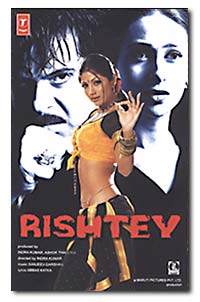|
|
|
Producer: Indra Kumar & Ashok Thakeria Director: Indra Kumar Starring: Anil Kapoor, Karisma Kapoor & Shilpa Shetty Music: Sanjeev - Darshan Lyrics: Abbas Katka, Sumit Singers: Asha Bhosle, Shaan, Mahalaxmi Iyer, Udit Narayan, Sonu Nigam, Kavita Krishnamurthy-Subramaniam, Anuradha Paudwal, Sunidhi Chauhan, Sanjeev Rathod & Neha Audio On: T-Series Number of Songs: 11 Released on: November 04, 2002 |
Reviewed by: M. Ali Ikram Reviewer's Rating: 6.5 out of 10 |
 After the abysmal music (and motion picture) that was Aashiq,
Indra Kumar returns again with the duo, Sanjeev-Darshan to score his latest flickīs tunes. But thereīs a catch this time. Knowing that the duo dried out their well-springsī of talent with their first two soundtracks
(Mann and Deewane), Kumar has used the assistance of
Ranjit Barot to provide the musical arrangements to some of
Rishteyīs tracks. And when Barotīs there, the score often works well. When heīs not, it is just passable.
After the abysmal music (and motion picture) that was Aashiq,
Indra Kumar returns again with the duo, Sanjeev-Darshan to score his latest flickīs tunes. But thereīs a catch this time. Knowing that the duo dried out their well-springsī of talent with their first two soundtracks
(Mann and Deewane), Kumar has used the assistance of
Ranjit Barot to provide the musical arrangements to some of
Rishteyīs tracks. And when Barotīs there, the score often works well. When heīs not, it is just passable.
"Har Taraf Tu Hi" is the perfect example of Barot rising to the challenge. Shaan outshines Mahalaxmi Iyer (last heard in Surīs brilliant "Kabhi Shaam Dhale") in the vocal department, but the true star of the ballad is the drum beat, guitar and operatic choral accompaniment. Hereīs a soulful depth rarely heard in Sanjeev-Darshan tunes, and youīll thank your ears for it.
Udit Narayan commands "Rishta Tera, Rishta Mera" with unqualified success. His long version of the song is accompanied with forceful and punctuated instrumentation that seems to be somewhat of a "call to arms", and yet that is what makes it so pleasant an aural experience. Itīs a unique and apt approach to convey the father-son bonding trackīs theme.
Uditīs later sad version of "Rishta" might bring a tear to the eyes of some over-sensitive folks, but I wish it were longer. Of course, Nehaīs sad child version will make you cry, but only because the poor girlīs singing for a boy is inexcusably poor.
Udit Narayan and Anuradha Paudwalīs "Apna Banana Hai" has no input from Barot, and hearing it, youīll be able to discern the difference from the songs mentioned above. A partial ode to the organ-based melodies of a Raj Kapoor era gone by, this one just doesnīt work. It isnīt unbearable, but not exactly the kind of stuff for which the rewind button was invented.
Originality be damned, I guess no one noticed or cared that "Deewana Deewana" - in two versions, courtesy Udit Narayan and Sunidhi Chauhan - is a sly lift of 2001īs "Deewana Tera Hai" from Koi Mere Dil Se Poochhe. If only because of the novelty back then, it sounded better last year. And also because Rajesh Roshan (even on his off-days) is an icon that both Ranjit Barot and Sanjeev-Darshan combined cannot compete against.
Surprise, surprise. Asha Bhosle lifts "Dilbar Dilbar" to heights better than the tune or lyrics themselves deserve. Of course, legends can have such positive effects. For those wondering, this frisky tune is not as musically techno-dependant as Nadeem-Shravanīs similarly themed "Dilbar Dilbar" from Sirf Tum. But inspite of the extra instruments used this time around, the overall results are no better than the older tune. Maybe a certain Barotīs absence is again the key to the problem?
Ranjit Barot sure likes his wind instruments. He (or Sanjeev-Darshan) chose to begin "Tu Tu Hi Tu Dil Mein Hai" using a recorder prelude, much like the recurring effects in Anu Malikīs Asoka. Other wind and string instruments take the track to sweeter places. Udit Narayan and Anuradha Paudwal work great together this time around to lend the simply worded track the innocence it needs. To classify "Apun Ko To", rendered by an aggressive Sunidhi Chauhan and Sanjeev Rathod (the first half of the music director duo), as good music requires a stretch of the imagination. Whether it is the tired lyrics of guest lyricist, Sumit, the uninspired singing or the hard rock heavy music, each part of the whole is just mediocre.
"Yaara Re Yaara Re" is fun, peppy and cool. Sonu Nigam joins Kavita Krishnamurthy Subramaniam for a dance-based tune dependant on electronic beats to lift your spirits. A word of advice to Kavita though, who is good here, but should be careful with the pitch of her voice. It can sometimes rise to unpleasant territories. Had she sung her "Yaara" refrains one note higher, our ears would have been cursing at her.
Song wording wise, Abbas Katkaīs lyrics for Rishtey are a smidge better than those of Indra Kumarīs absent regular, Sameer. That is not saying much, since Sameer-saab largely writes at about a grade three poetry level. But at least the word "dil" is not abused beyond recognition, like in the recent "Dil Ka Rishta" and "Dil Hai Tumhaara" soundtracks. Katkaīs style is also to repeat words over and over and over and over again, but this time the words are the novel rishta, tu, dilbar and yaara. Quite different, no?
Watching the promos for Indra Kumarīs Rishtey, one gets a feel that this time around the director may return to his commercial success heyday (Dil, Beta, Raja and Ishq). But his hit films would always rely on great music. Even Mann (an undeserved failure at the Indian box office) had a lovable soundrack. Rishteyīs score is a partial step in the right direction after the abysmal Aashiq, but can the director make a hit film this time with a better story-line than music?